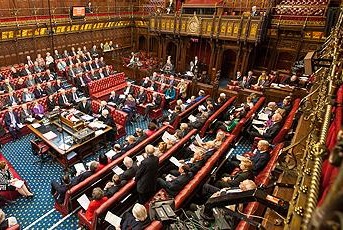Lords vote to remove clause 28 of the Bill allowing UK to offshore asylum seekers
The Nationality and Borders Bill returned to the House of Lords today for the second day of report stage.
 Image credit: UK GovernmentAs we reported on EIN on Monday, the first day of report stage saw the Lords inflict a number of defeats on the Bill. Further defeats have followed today.
Image credit: UK GovernmentAs we reported on EIN on Monday, the first day of report stage saw the Lords inflict a number of defeats on the Bill. Further defeats have followed today.
By 208 votes to 155, the Lords voted to remove clause 28 of the Bill, which would allow asylum seekers to be removed from the UK and sent overseas to a third country for their asylum claim to be processed.
Baroness Stroud said the clause was unworkable on numerous levels, and it would expose vulnerable people to further trauma rather than offering them protection.
Detention Action called the result of the vote "great news" and said: "The Government's plans to send people seeking asylum to offshore detention camps will now be considered by MPs, and we must make sure they are scrapped, once and for all."
The Lords also voted by 221 to 172 to add an amendment to ensure that the Bill's clause 15 on inadmissible asylum claims can only come into force when safe returns agreements with third countries are in place.
Clause 15 would allow the Government to consider a claim to be inadmissible and remove an asylum seeker from the UK if they travelled through a safe third country or have a connection to a safe third country.
Lord Etherton, a former Master of the Rolls, said clause 15 was contrary to the Refugee Convention and a breach of the UK's obligations under the Convention. Etherton said the conditions in the clause were a rewriting of the Refugee Convention and were not a legitimate interpretation. The fact that a decision to declare a claim as inadmissible would not be subject to a right of appeal made clause 15 all the more egregious as a breach of the Convection, Etherton added.
By 101 votes to 96, the Lords voted to amend the Bill and remove the parts of clause 39 that would make it a criminal offence for a person to arrive in the UK without a valid entry clearance to seek asylum.
In a further vote, an amendment by Lord Dubs to allow unaccompanied children in Europe to be reunited with family in the UK while they claim asylum was passed by the Lords by 178 votes to 130. Another amendment committing the UK to resetting 10,000 refugees annually passed by 169 votes to 122.
The Lords voted by 86 votes to 84 to remove the subsection of the Bill's clause 40 that widens the offence of helping an asylum seeker enter the UK to include all assistance rather than just "for gain".
By 83 votes to 76, the House of Lords voted to amend the Bill due to concerns over the Government's plans to push back boats in the Channel. The amendment specifies that the powers of immigration officers and enforcement officers can only be used when they do not endanger life at sea.
Report stage continues with day three next Tuesday.
As explained by the Institute for Government, if the House of Lords and the House of Commons do not agree on the wording of a bill, it is sent back and forth between the two Houses and they respond to each other's proposed amendments in a process known as 'ping-pong'.